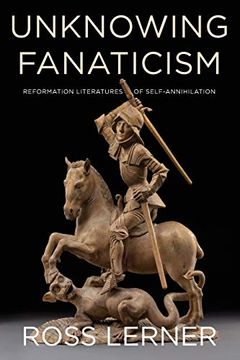Share
Unknowing Fanaticism: Reformation Literatures of Self-Annihilation
Ross Lerner (Author)
·
Fordham University Press
· Paperback
Unknowing Fanaticism: Reformation Literatures of Self-Annihilation - Ross Lerner
Choose the list to add your product or create one New List
✓ Product added successfully to the Wishlist.
Go to My Wishlists
Origin: Spain
(Import costs included in the price)
It will be shipped from our warehouse between
Thursday, June 06 and
Monday, June 17.
You will receive it anywhere in United Kingdom between 1 and 3 business days after shipment.
Synopsis "Unknowing Fanaticism: Reformation Literatures of Self-Annihilation"
We may think we know what defines religious fanaticism: violent action undertaken with dogmatic certainty. But the term fanatic, from the European Reformation to today, has never been a stable one. Then and now it has been reductively defined to justify state violence and to delegitimize alternative sources of authority. Unknowing Fanaticism rejects the simplified binary of fanatical religion and rational politics, turning to Renaissance literature to demonstrate that fanaticism was integral to how both modern politics and poetics developed, from the German Peasants' Revolt to the English Civil War. The book traces two entangled approaches to fanaticism in this long Reformation moment: the targeting of it as an extreme political threat and the engagement with it as a deep epistemological and poetic problem. In the first, thinkers of modernity from Martin Luther to Thomas Hobbes and John Locke positioned themselves against fanaticism to pathologize rebellion and abet theological and political control. In the second, which arose alongside and often in response to the first, the poets of fanaticism investigated the link between fanatical self-annihilation-the process by which one could become a vessel for divine violence-and the practices of writing poetry. Edmund Spenser, John Donne, and John Milton recognized in the fanatic's claim to be a passive instrument of God their own incapacity to know and depict the origins of fanaticism. Yet this crisis of unknowing was a productive one. It led these writers to experiment with poetic techniques that would allow them to address fanaticism's tendency to unsettle the boundaries between human and divine agency and between individual and collective bodies. These poets demand a new critical method, which this book attempts to model: a historically-minded and politicized formalism that can attend to the complexity of the poetic encounter with fanaticism.
- 0% (0)
- 0% (0)
- 0% (0)
- 0% (0)
- 0% (0)
All books in our catalog are Original.
The book is written in English.
The binding of this edition is Paperback.
✓ Producto agregado correctamente al carro, Ir a Pagar.

